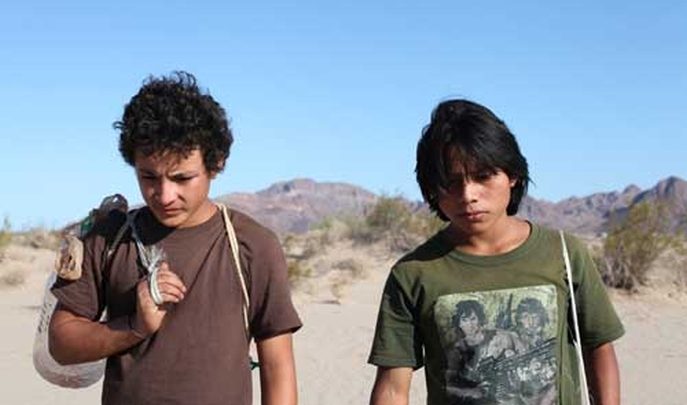Lingua Franca Cinema – Use Foreign Language Films To Support Your MFL Classes

A selection of movies from across the world that can support the teaching of modern foreign languages…

- by Into Film

Studying foreign languages expands cultural horizons, breaks down barriers and increases living and working opportunities for young people. In addition, studies have shown that it can improve memory, brain power and use of English.
Yet many young people are deterred by the challenges of language learning. We, as educators, must use all available tools to make the subject as interesting and accessible as possible.
Watching a film in class or a school club is a perfect way to learn a foreign language in context, while being exposed to real life conversation and new day-to-day phrases and vocabulary. Foreign language films are also useful in supporting the teaching of foreign texts, and can provide a powerful insight into other cultures.
Diversity for autumn
In keeping with its autumn theme of diversity, Into Film has a wide choice of foreign language films and related teaching guides. Popular choices for French include A Bout De Souffle (PG), Jean de Florette (PG) and Girlhood (15).
Spanish titles range from The Spirit of the Beehive (PG) and Diarios de Motocicleta (15) (based on Che Guevara’s diary). Berlin ’36 (PG), Goodbye Lenin (15) and pacy thriller Victoria (15) are among those on offer for German.
Also available are films in Arabic, Italian, Mandarin and numerous other languages. Films are free to order for all schools with an Into Film Club.
Free screenings of foreign films with accompanying teaching resources will also be a feature of the Into Film Festival 2016, which takes place from November 9th to 25th. This year’s programme includes 3000 free screenings and events in venues all over the UK.
Into Film Recommends
The Golden Dream (12) 14+ Spanish with English subtitles An unconventional road movie about a group of undocumented teenage Guatemalan immigrants and their journey to what they hope will be a bright new life in the US. Unfortunately, they are ill-prepared for the precarious journey and the reality of what awaits them. A, tough, uncompromising, but moving testament to the power of friendship and camaraderie in the most testing of circumstances.
1. How did the Spanish speakers Juan and Sara communicate with the indigenous boy Chauk? What was the first Spanish word Chauk uses independently, and why do you think this was?
2. Why do you think the imperative tense was used so dominantly in the film? Give examples of some of the phrases you recognised and their English translations.
3. What imagery and symbolism was repeated throughout the film? How did you interpret it?
Review starter: When a group of Guatemalan teenagers set out for the US border…
Berlin ’36 (PG) 11+ German with English subtitles
Based on a true story, this German drama tells of the experience of two athletes in the lead-up to the Berlin-hosted 1936 Olympics. Champion high jumper Gretel Bergmann is Jewish, and as such has the potential to undermine the ruling Nazi party’s racist ideology.
To prevent her winning a gold medal, they scheme to replace her with new team member Marie, who has been brought up as a woman, but is in fact male, and has been threatened with incarceration if she does not cooperate. As a result, the two athletes form a bond over their shared feeling of otherness.
1. How did Marie try to reach out and communicate with Gretel? What did she use?
2. How does the camerawork show the increasing sympathy between Gretel and Marie? At what moment(s) do you see this technique repeated?
3. Much of the atmosphere in the film is created by what goes unsaid. What other important information is communicated indirectly?
Review starter: As an exceptional Jewish athlete, Gretel Bergmann defied Nazi ideology…
La Famille Bélier (12) 11+ French with English subtitles
A sweet comedy-drama about Paula, a hearing girl born into a deaf family who discovers she has a gift for singing.
Encouraged by her music teacher to pursue her talent by applying for an exclusive music school in Paris, her decision is complicated by her family’s reliance on her to help them communicate with the hearing world. Unable to experience their daughter’s gift, her parents try to be supportive, despite their fear of losing their translator.
1. What do you understand by Paula’s father’s claim that being deaf is ‘not a disability but an identity’, and did Paula’s mother support this view?
2. How did Paula’s actions affect the flow of communication at the TV interview? At what other moments did Paula help or hinder her parents during translation?
3. Aside from signing, what other forms of non-verbal communication were used in the film?
Review starter: When the discovery of her talent for singing opens up the possibility of a new life, Paula feels torn…
Into Film is a UK-wide education organisation which puts film at the heart of young people’s learning and personal development through access to a catalogue of over 3,500 films, curriculum-linked and enrichment teaching resources, filmmaking opportunities and educator training.
To set up a free Into Film Club, download resources or sign up for free training, visit www.intofilm.org; you can also follow @intofilm_edu
Browse our resources for European Day Of Languages.











